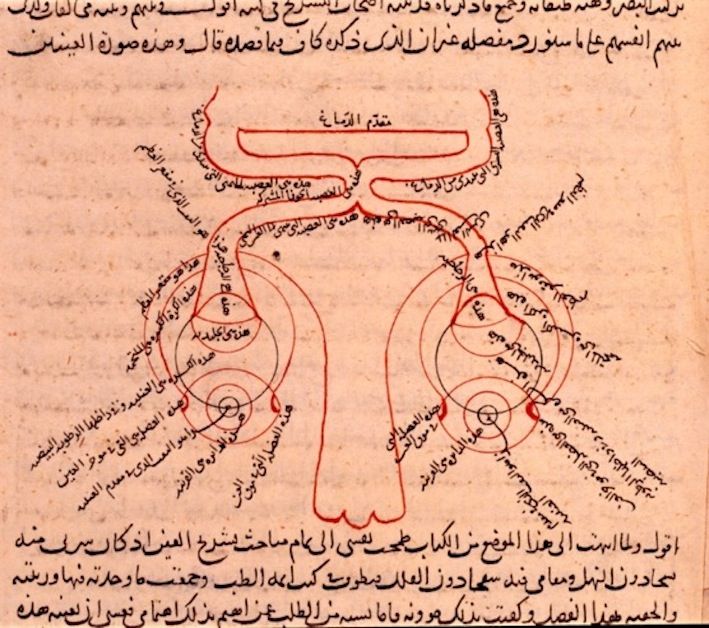
There was no rupture between Islam and science until sometime around the 11th century. The Mu‘tazila[1] played a historical role by their adoption of the rational (not scientific) method in Islam, and this method lead to the abortive scientific awakening in Islamic history. After the campaign against the Mu‘tazila and the rational method the scientific awaking and its thinkers came under criticism.[2]
ISLAMIC THINKERS such as Abū Hamid al-Ghazali, Ibn Taymiyya and Ibn Qayyim al-Jawziyya and others took a negative position on science and intellectual speculation, a position which led to the end of scientific and intellectual activity in all but some few limited fields which, even if they took place between the 7th and 10th centuries AD, did not amount to a cultural phenomenon as before.[3] At around the 11th century Islamic thought created a gap which proceeded to widen over several centuries until culminating in a rupture between science and religious thought. The result was an intellectual and cultural stagnation that dominated Islamic societies right up to the fall of the Ottoman state at the beginning of the 20th century.
After Islamic societies in the 20th century grasped the huge value of science and its applications, modernist thinkers began to make their return to science. Among the more conspicuous attempts (as it appears) called for by some contemporary Islamist thinkers one may list the ‘scientific miracle of the Qur’ān’ and the ‘Islamization of science.’ The first is an attempt that bases itself on investigating evidence of scientific accomplishments between the lines of the Holy Book, as if this were an encyclopedia of science. The second attempt seeks to accommodate two intellectual currents: Islamic thought and scientific thought.
Here one might wonder why there is this insistence upon forcing religious thought to run breathless in a bid to catch up with science and its achievements. In doing so some modern Islamist thinkers are giving a clear demonstration of contemporary Islamic thought’s need for scientific thinking, and not vice versa. After Islamic thought militated against thought and science for several centuries, some of its contemporary exponents are now trying to return to science, but now solely by ideologizing it and attempting to present the Qur’ān as some encyclopaedia of science.
A first initiative at Islamizing knowledge was made about the year 1969 by the Malaysian thinker Syed Muhammad al-Naquīb al-‘Attās[4], and many Islamists such as the Iranian American thinker Seyyed Hossein Nasr and the Palestinian American Ismā‘īl al-Farūqī and others have followed in his footsteps. But there are many Islamist thinkers, such Ahmad Ibrāhīm Khidr,[5]who wholly reject this direction, considering it to be an attempt to establish [science’s] superiority over Islamic thought.[6]
Islamization of science is nothing but an attempt to reconcile it with the restrictions imposed by al-Ghazali
The contemporary Islamization of science is nothing but an attempt to reconcile modern science with the intellectual restrictions imposed by al-Ghazali.[7] The problem is that these modernists are well aware of the breadth of the scientific gap between Islamic societies and the West, but they have not studied the cause of the centuries-long separation problem between science and Islamic thought. Al-Ghazali’s thinking was but one of the causes which led to the closing of thought. Now they aspire to modify scientific reasoning to accommodate a mindset that is centuries old and recalcitrant to modernisation. There is no doubt that it was an intellectual problem that led, and still leads on a daily basis, to major disasters. A mindset that led to the extinguishing of that newborn scientific activity cannot inject new life into the dead corpse of a science which has been killed off and lain in pieces for centuries.
Any proposition of the above two attempts (scientific miracles and the Islamization of science) would have to be undertaken from a position of knowledge of the nature of scientific thought. Science, fundamentally, is a research (methodological) logic and is more than a matter of scientific achievements and theories. Moreover, science works upon itself through self-criticism and scrutiny; we therefore find that scientific knowledge is distinguished by its being delimited in the field of its particular study (within specific contours) and is able to modify itself and change according to a scientific reasoning. In science there is no sanctity or absolute knowledge that cannot be altered. Scientific knowledge cannot be passed on by simple repetition and is only accepted as such under specific conditions established by the scientific research method.
Science accepts criticism and in fact demands it, in that scientific development cannot take place without critical scrutiny and examination. A great deal of what we find, particularly on the cutting edge of new science, consists of differences of opinion and sharp debate. But in the end the adjudication is made by experimental evidence.
This is even the case in the humanities, which began to gain momentum under the umbrella of science and which adopted its exact and precise reasoning and constant self-criticism in its quest for maximum scientific reliability. On this I would like to recall the academic Edward Said’s criticism of Orientalism.[8] Said did not reject Orientalism as a sober research method, but criticized the actions of the Orientalists. In this way he did not criticize the method and consider it to be a failure, but criticized the way this method was applied.
In science there is no sanctity or absolute knowledge that cannot be altered
The scientific method did not make any further progress during the period of the Arab-Islamic awakening. Nevertheless, there were early signs of the emergence of such an approach and historians of science grant Al-Hasan ibn al-Haytham (965-1040) primacy in the employment of mathematical and experimental reasoning in his researches in the field of optics,[9] since he showed himself familiar with corroboration and logical criticism.[10] For these are some of the elements of the modern scientific reasoning that took on its contemporary form in the investigative work of Francis Bacon (1561-1626), that is, five centuries after Al-Hasan ibn al-Haytham. For Bacon it was who introduced the concepts of scientific hypothesis and empiricism.
In this context it is worth mentioning his scientific explanation for prayer vows which some believers resort to making during times of weakness or when they feel in need of help.[11] It was the usual practice for men of the cloth to take pride in listing the number of believers whose prayers were answered, but Bacon wondered why the number of those whose prayers were not answered was not similarly listed. To confirm a theory that believers’ prayers are being answered requires that these be investigated statistically, as we say in our present time, and not left to be a mere claim that the believers’ demands are being secured.

Suggested Reading
The Natural Sciences – Between Religion and Religious Thought (Part 1)
Had the intellectual setback which led to the destruction of the first signs of scientific activity in Islamic culture not occurred, the thought of Al-Hasan ibn al-Haytham might well have developed on the spot towards scientific achievements in advance of Francis Bacon’s methodology. Where then does the problem of ideologizing scientific thought lie? Science (the natural sciences) as a research method requires[12]:
1-defining the phenomenon to be studied and ascertaining its validity. That is, whether the starting point is a matter of ignorance or of doubt;
2-examining hypotheses concerning the interpretation of the phenomenon. The hypothesis must present as a subject of research – in addition to the interpretation of the phenomenon itself – some predictions of things still unknown. Should these predictions generate discoveries or something new, then this adds to the credibility of the hypothesis;
3-testing the hypothesis by experiment and observation, as in all studies. The result of the operation may confirm the hypothesis or may lead to its rejection or modification.
[1] See Glossary.
[2] See M. I. Sanduk’s Almuslih article: The natural sciences between religion and religious thought – 1, January 27, 2012.
[3] M. I. Sanduk, Growth of science under the influence in Arabic-Islamic and Western Civilisations, 700-1900 (Statistical Models).
[4] S. M. Al-Naquib Al-‘Attās, Islam and Secularism, Hindustan Publications, Delhi, 1984. (Editor’s note): Al-‘Attās holds that modern sciences must be acquired, but their philosophical foundations must be recast into the Islamic metaphysical framework: “ We do affirm that religion is in harmony with science,” he argues, “but this does not mean that religion is in harmony with modern scientific methodology and philosophy of science. Since there is no science that is free of value, we must intelligently investigate and study the values and judgments that are inherent in, or aligned to, the presuppositions and interpretations of modern science. We must not indifferently and uncritically accept each new scientific or philosophical theory without first understanding its implication and testing the validity of values that go along with the theory. Islam possesses within itself the source of its claim to truth, and does not need scientific or philosophical theories to justify such a claim. Moreover, it is not the concern o
f Islam to fear scientific discoveries that could contradict the validity of its truth.” [Prolegomena, p.38].
[5] A.I Khidr, حول ظاهرة اسلمة العلوم (‘On the Islamizing Science phenomenon’) http://www.alukah.net/Culture/0/28204 .
[6] (Editor’s note): A. I. Khidr sums up his position thus: “As far as we see it one may say that the whole project [i.e. of Islamizing science], including its moderate current, falls into a basic error: the lack of belief in the completeness and perfection of the Sharī‘a. The project’s proponents consider the Sharī‘a insufficient to face up to the changes of the modern age, as if God Almighty (exalted be He above all that men imagine!) did not know that these changes would occur and did not take them into account, so that this project has come about to correct and complete what God had wrought!” (A.I Khidr, حول ظاهرة اسلمة العلوم ‘On the Islamizing Science phenomenon’).
[7] S. M. Al-Naquib Al-Attas, Islam and Secularism, Hindustan Publications, Delhi, 1984.
[8] E. Said, Orientalism, Vintage Books: New York, 1979.
[9] See Almuslih article: The natural sciences between religion and religious thought – 1, January 27, 2012.
[10] J.C. Plott, Global History of Philosophy: Vol.V, The Period of Scholasticism, Motilal Banarsidass, 2000.
[11] S. Matthews, Theology and science in the thought of Francis Bacon, Ashgate Publishing, Ltd., 2008.
[12] J. Kemeny, A Philosopher Looks at Science, Van Nostrand Company, Inc., 1959.
Main image: illustration from Ibn al-Haytham’s Kitab al-Manazir (‘Book of Optics’).



